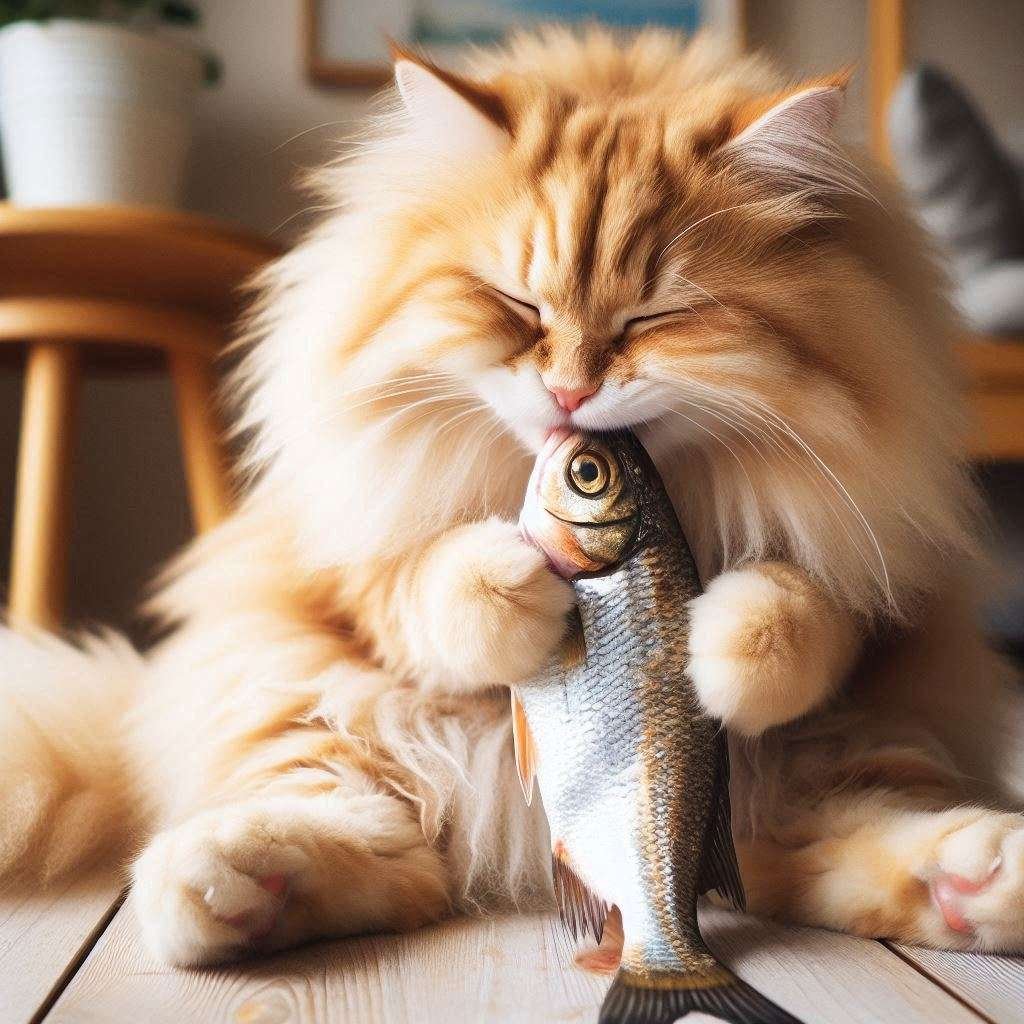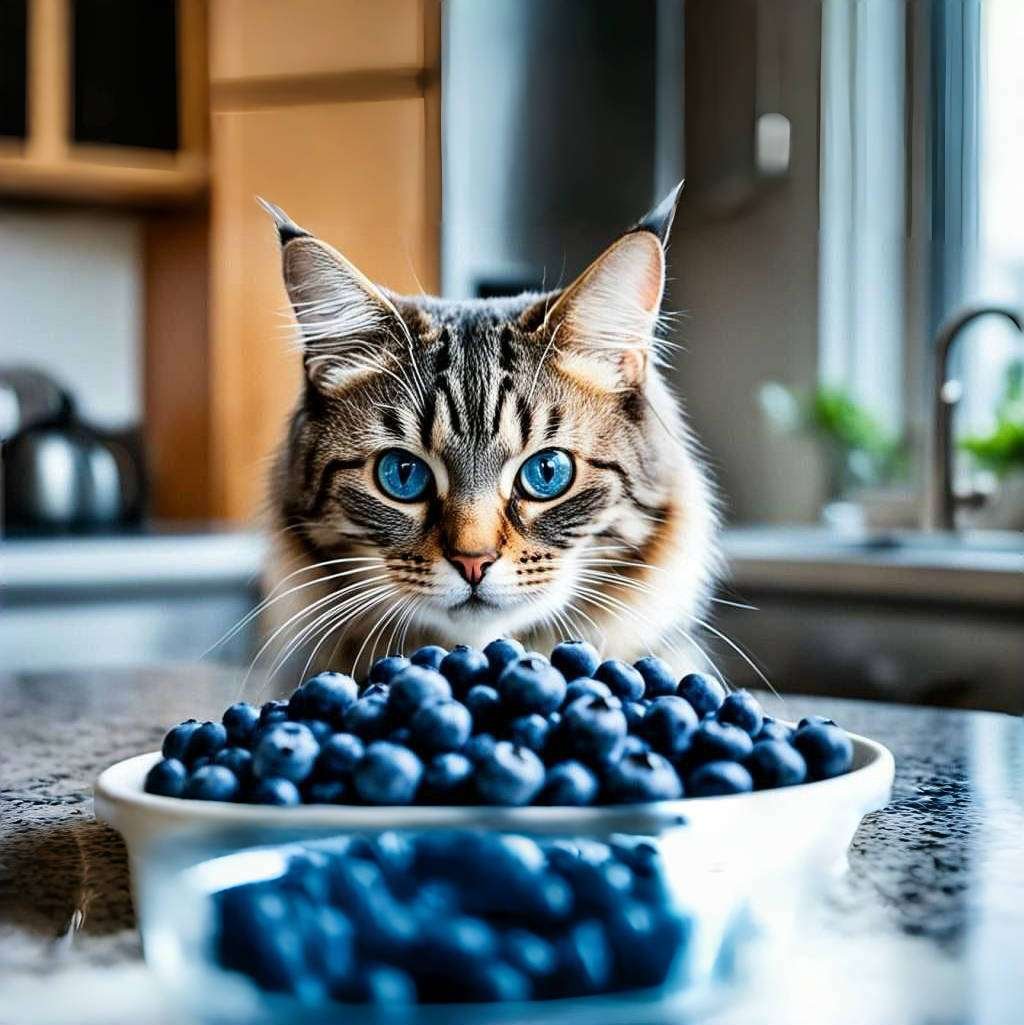Can cats drink tea? Many people wonder if tea is safe for cats. The answer is no, cats should not drink tea. Tea has a lot of caffeine, which is bad for cats. It can make them very active, increase their heart rate, and cause serious health problems.
Other things in tea like sugar and cream are also not good for cats. Some herbal teas might be safer, but it’s best to keep your cat away from all tea. This keeps them safe.
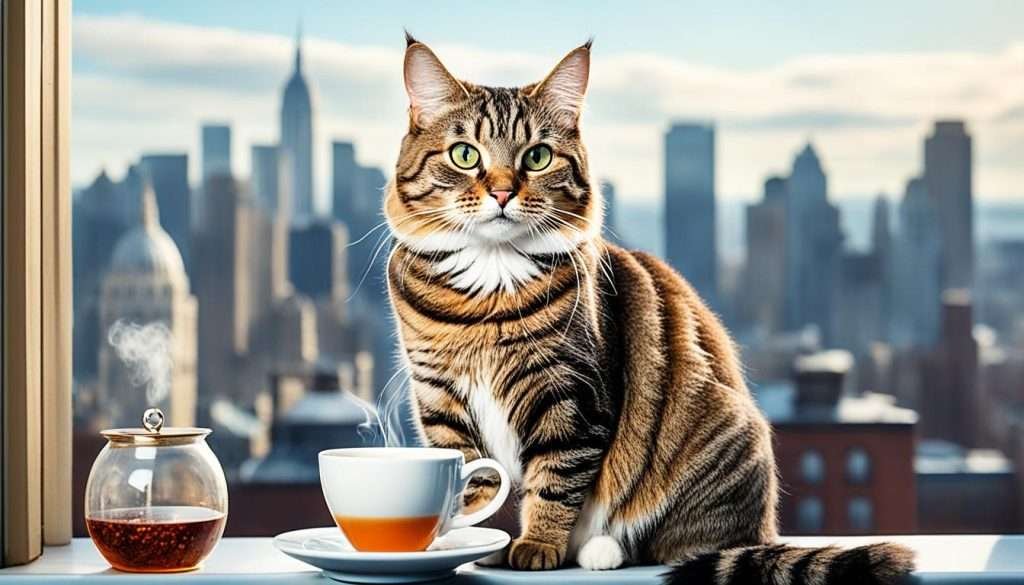
Key Takeaways
- Most teas contain caffeine, which is toxic to cats.
- Herbal teas are generally non-toxic to cats, but certain herbs and spices can still be unsafe.
- Common tea additives like sugar and artificial sweeteners can be harmful to cats.
- Teabags present a choking hazard for cats.
- Consulting a veterinarian before giving cats any human food or drinks is recommended.
Introduction to Cats and Tea
Cats are curious and their owners might want to share tea with them. But, it’s important to know the risks and safe options for cats and tea. This part will cover the basics and why knowing about cat-friendly drinks is key.
Overview of the Topic
Tea smells and tastes good, but it can be bad for cats. Black and green tea have caffeine, which can harm cats. Also, the sugars and dairy in tea are not good for cats. Knowing this helps keep your cat healthy.
The Importance of Understanding Feline Beverage Safety
Cats need special nutrition and can react badly to some human foods. Giving them cat-friendly beverages and avoiding risks of tea for cats is important. Learning about healthy alternatives to tea and feline nutrition helps you make good choices for your cat.
We’ll look into the dangers of tea for cats, safer herbal teas, and how to make drinks for your cat in the next parts.
Caffeine: The Primary Danger in Tea for Cats
Tea can be dangerous for cats because of its high caffeine levels. Cats can’t handle caffeine well. Even a little can cause big problems. Caffeine makes cats very active, speeds up their heart, and can upset their stomach. In the worst cases, it can lead to seizures and coma.
Effects of Caffeine on Cats
Cats can’t break down caffeine like people do. A small 8-pound cat only needs about 80 milligrams of caffeine to show signs of poisoning. A single cup of black tea has around 50 milligrams of caffeine.
Caffeine can cause many bad effects in cats, including:
- Hyperactivity and restlessness
- Rapid heart rate and palpitations
- Digestive issues like vomiting and diarrhea
- Seizures and coma in severe cases
Symptoms of Caffeine Toxicity in Felines
The first signs of caffeine toxicity in cats can show up in 30 minutes. They can last up to 6 to 12 hours. Pet owners should look out for these signs of cat health risks from dangers of caffeinated drinks:
- Restlessness and hyperactivity
- Rapid breathing and increased heart rate
- Vomiting and diarrhea
- Tremors and seizures
- Elevated body temperature
- Abnormal heart rhythm
If you see any of these signs, call a vet right away. They can help and prevent serious problems.
“Cats are much more sensitive to caffeine than humans, and even small amounts can have serious consequences.”
Sugar and Cream: Additional Risks in Tea for Cats
Tea is not just a concern for cats because of caffeine. Sugar and cream in tea can also be harmful to our pets. These ingredients can cause health issues for our furry friends.
Cats can’t digest sugar well. This can lead to weight gain, obesity, and even diabetes. Feline obesity is a big problem. It’s important to limit sugar to keep cats healthy and avoid health problems.
Many cats can’t handle lactose in milk and cream. This can cause problems in cats like stomach cramps, soft stools, and diarrhea.
- Cats lack the enzyme to properly digest sugar, and too much can lead to obesity and diabetes.
- Milk and cream can cause digestive issues like stomach cramps, soft stools, and diarrhea due to lactose intolerance.
It’s important to think about the sugar and cream dangers for cats before giving them tea or other human drinks. These ingredients, along with caffeine, make tea a bad choice for cats.
“Cats are obligate carnivores, meaning they require specific nutrients found only in animal-based proteins. Feeding them human foods like tea, which is not part of a natural feline diet, can lead to serious health problems.”
Knowing the dangers of tea and its ingredients helps us make better choices for our pets. This way, we can keep our cats safe and healthy.
Can Cats Drink Tea? The Short Answer
No, cats should not have tea. Tea has caffeine, sugar, and dairy, which are bad for cats. These can cause serious health problems, so it’s best to keep tea away from cats.
Caffeine in tea can make cats more active and restless. Signs of a cat drinking tea include diarrhea, vomiting, and high blood pressure. A small cat can get very sick from just 80 milligrams of caffeine, which is in one cup of black tea.
Herbal or fruit teas can also be harmful to cats because of ingredients like citrus or essential oils. Watch your cat closely if they drink tea and look for signs of illness. If your cat seems sick or has drunk a lot of tea, call a vet right away. They might need fluids, activated charcoal, or to vomit to get rid of the toxins.
“Symptoms of caffeine poisoning in cats can appear within 30 minutes of ingestion and last between six to twelve hours. Cats can exhibit symptoms such as hyperactivity, restlessness, agitated behavior, panting, elevated heart rate, vomiting, tremors, and heart palpitations.”
Tea, with or without caffeine, is not safe for cats and should be avoided. Even if a cat seems okay after drinking tea, it could still be harmful over time. Always talk to a vet before giving tea to your cat.
Herbal Teas: A Safer Option for Feline Sipping
Regular black or green tea is not safe for cats because of the caffeine. But, some herbal teas might be okay for cats. Teas like chamomile, valerian, and fruit blends could be good for cats. They offer health benefits without the caffeine danger.
Cat-Friendly Herbal Tea Varieties
Some herbal teas for cats are safe and great for them. Here are a few:
- Chamomile: Known for calming cats, chamomile tea is a safe beverage for cats.
- Valerian: This herb helps cats relax, making it a good cat-friendly infusion.
- Fruit-based blends: Teas with safe fruits like raspberries or blueberries are tasty and beneficial for cats.
Benefits of Herbal Teas for Cats
Herbal teas are a safe choice instead of regular tea. They also have many benefits of herbal tea for cats:
- Calming and Relaxation: Herbs like chamomile and valerian soothe cats, easing anxiety and helping them relax.
- Digestive Support: Some teas can ease digestive problems like gas, bloating, and indigestion.
- Immune System Boosting: Teas like echinacea might boost a cat’s immune system, improving their health.
Even though herbal teas for cats are safer, always talk to your vet before giving them to your cat. This is true for any new drinks or supplements.
Preparing Tea for Your Cat
If you’ve decided to give your cat a sip of herbal tea, make sure to prepare and serve it right. This ensures they can enjoy it safely without any health risks. Let’s look at the best way to prepare and serve tea for your cat.
Proper Steeping and Cooling Methods
When brewing tea for your cat, keep the steeping time short. Aim for 3-5 minutes to avoid a strong or concentrated tea. This helps prevent caffeine toxicity or other bad effects. After brewing, let the tea cool down before serving.
Cats have sensitive tongues, so hot tea could burn them. So, it’s important to serve it cool.
Serving Suggestions for Cats
Once the tea is cool, pour it into a shallow bowl or saucer. This makes it easy for your cat to drink. Use wide, shallow surfaces for drinking, not tall containers. Cats don’t like very cold or icy drinks, so serve at room temperature.
Start with small tea portions and watch how your cat reacts. Aim for 1-2 tablespoons per serving. The goal is to give them a tasty treat, not a full meal.
| Recipe | Servings |
|---|---|
| Simple Catnip Tea | 2 |
| Honey, The Cat’s Dipped The Nip Again (Catnip Tea) | 4 |
| Iced Catnip Tea | 4 |
| Catnip Tea Ice Cubes | 12 |
| Catnip Ginger Tea | 12 |
| Champagne Tastes Catnip Tea | 4 |
When giving tea to your cat, preparation and serving are key. By following these steps, you can make sure your cat has a safe and enjoyable tea experience.
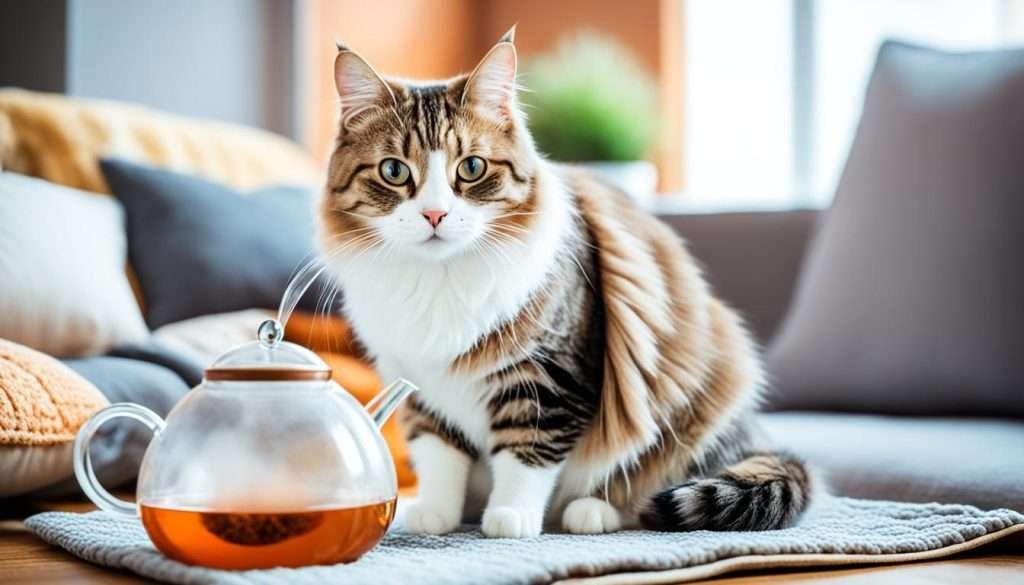
“Catnip tea can be a delightful treat for your feline companion, but it’s essential to prioritize their safety and well-being. Proper preparation and serving methods are key to providing a positive experience for your cat.”
Can Cats Drink Tea Made From Toxic Plants?
As cat owners, it’s important to know that not all herbal teas are safe for our cats. Some plants used in tea can be very harmful to cats. We need to learn about the dangers of cats drinking tea from toxic plants.
Identifying Potentially Harmful Ingredients
There are 13 herbs that are toxic to cats. These include some common tea ingredients, such as:
- Garlic, onion, and chives – Can cause red blood cell damage in cats
- Marijuana – Can lead to severe effects like vomiting, seizures, and even death
- Foxglove – Can result in cardiac arrhythmias, weakness, and cardiac failure
- Lavender, oregano, marjoram, and mint – May cause mild vomiting and diarrhea
- Chamomile – Can trigger allergic reactions, vomiting, diarrhea, and bleeding
- Lemon grass – Can upset a cat’s stomach, although the reaction may not be as intense
- Bay laurel – Can cause obstruction, vomiting, and diarrhea, especially in large quantities
- Tarragon, epazote, and mint – Also listed as toxic to cats
It’s important for cat owners to check tea ingredients carefully. Avoid any blends with these harmful herbs.
Even if some herbs seem safe, it’s better to be careful with our cats. Tea made from toxic plants can cause many problems, like nausea and vomiting. It can even lead to serious issues like heart problems and seizures.
| Toxic Plant | Potential Effects on Cats |
|---|---|
| Garlic, onion, and chives | Red blood cell damage |
| Marijuana | Vomiting, seizures, coma, death |
| Foxglove | Cardiac arrhythmias, weakness, cardiac failure |
| Lavender, oregano, marjoram, mint | Mild vomiting and diarrhea |
| Chamomile | Allergic reactions, vomiting, diarrhea, bleeding |
| Lemon grass | Upset stomach |
| Bay laurel | Obstruction, vomiting, diarrhea |
To keep our cats safe, we must be careful with herbal teas. By knowing which plants are toxic, we can make safe choices for our pets.
Can cats drink tea? A Closer Look at the Evidence
Many say cats shouldn’t drink tea, but there might be more to it. Let’s explore the evidence, including studies and expert views. This will help us understand the risks and benefits of tea for cats.
Online stories warn against giving tea to cats, saying it can be toxic. But, some info online might not be right about what’s safe or not for cats. Cats can’t break down many compounds well, making them more prone to harm.
Chemicals in essential oils are very strong and can hurt cats. Cats can react badly to caffeine, showing signs within 30 minutes to 12 hours.
“Ethylene glycol in antifreeze is more deadly for cats than other household poisons. Rat and mouse poisons are common but not as deadly.”
But, some things like catnip are safe and fun for cats. About two-thirds of cats like catnip, thanks to their genes. Yet, some oils like lavender can be harmful if cats eat or touch them.
The internet often shares wrong info on what’s safe for cats. Green tea has more catechins than black tea, but we don’t know much about its effects on animals. Some stories say green/black tea might help with cancer treatment, but we need more research on its risks.
In summary, cats should avoid tea because the risks are higher than the possible benefits. Pet owners should give their cats safe drinks and treats to keep them healthy.
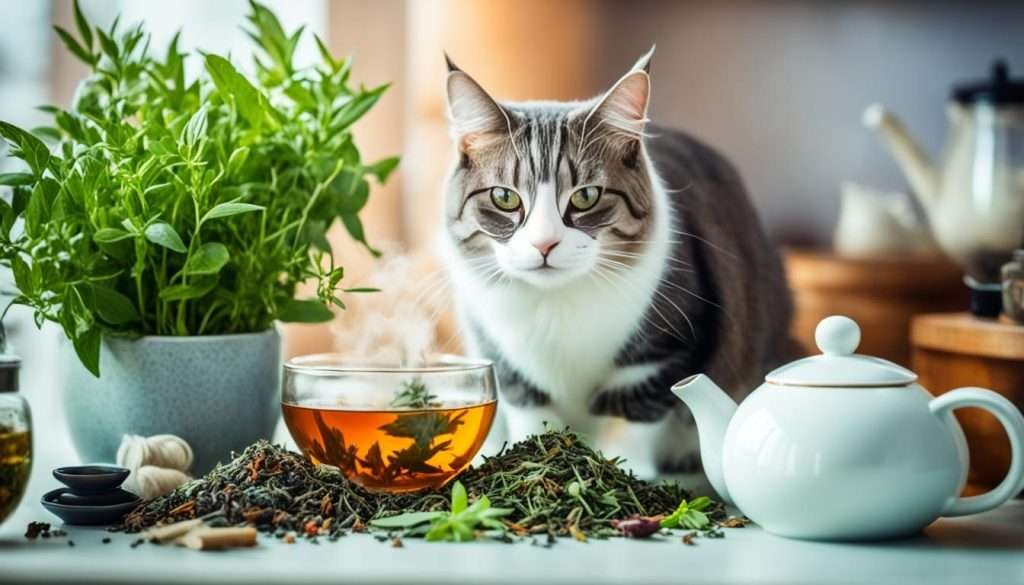
Alternative Beverages for Cats
Tea isn’t good for cats, so we need to find safer drinks for them. These drinks help your cat stay hydrated without the dangers of tea. Options include water, broth, and drinks made just for cats.
Hydrating Options for Felines
Water is the top choice for keeping cats hydrated. Cats can get sick from too much caffeine, about 80 milligrams. Water is the best choice for keeping cats hydrated without risks.
Other good drinks for healthy hydration for cats are:
- Homemade bone broth: This is safer than store-bought broths because it doesn’t have garlic or onion.
- Catnip tea: This cat-safe drink alternative can calm and hydrate your cat.
- Commercially prepared cat milks: These milks are made without lactose, making them safer than cow’s milk.
Always talk to a vet before giving your cat new drinks to make sure they’re safe.
| Beverage | Suitability for Cats | Benefits |
|---|---|---|
| Water | Highly Suitable | Maintains hydration without risks |
| Homemade Bone Broth | Suitable | Provides hydration and nutrients |
| Catnip Tea | Suitable | Soothing and hydrating treat |
| Commercially Prepared Cat Milks | Suitable | Lactose-free and designed for cats |
“Always consult a vet before introducing new beverages to cats to prevent harm and ensure the safety of feline health.”
Conclusion
Cats should not be given tea. Tea has caffeine, sugar, and dairy that can harm them. These can cause hyperactivity, digestive problems, seizures, and even coma.
Some herbal teas might seem safer, but it’s best to avoid all tea for cats. Instead, give them clean, fresh water and other safe drinks. Cats need about 3.5 ounces of water per 5 pounds of body weight daily.
Milk can also cause problems in cats. But, specially made cat milk is a better choice. The key is to keep tea away from cats to protect their health.
Tea, whether black, green, or herbal, is not good for cats. The risks are too high. By choosing wisely what our cats eat and drink, we keep them healthy and happy.

